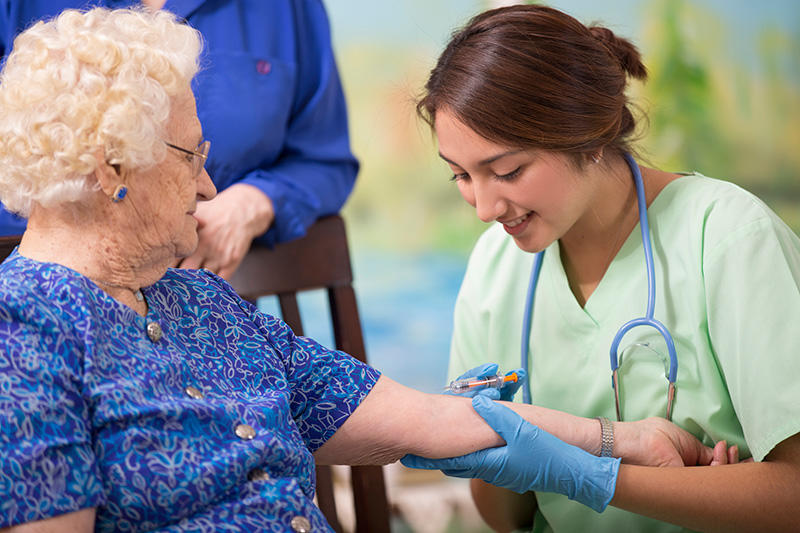Featured
Tags
Share

The movement to encourage more nurses to pursue Bachelor of Science in Nursing (BSN) degrees is going strong. In New York, legislation now requires newly licensed RNs who don’t have a BSN to earn their bachelor’s degree within 10 years.1 The Institute of Medicine’s Future of Nursing report advocates for healthcare settings where 80% of nurses are BSN-prepared.2
If you need or want to earn a BSN, you may be wondering, how long is an RN to BSN program? And you also may want to know more about what RN to BSN means. Let’s explore these and other vital topics for nursing professionals.
What Is an RN to BSN Nursing Program?
RN to BSN programs help registered nurses who have already earned an ADN or diploma progress to the bachelor’s level. What can you gain by earning a BSN? In an RN to BSN program, you can learn how to:
- Evaluate a patient’s condition
- Provide a patient with medicine and treatment
- Create plans for patient care and contribute to existing care plans
- Consult with doctors
- Collaborate with other healthcare professionals
- Help with diagnostic tests
- Analyze test results
- Advise patients and families how to manage illnesses and injuries
How Long Is an RN to BSN Program Option?
How long it takes to complete your RN to BSN depends on the specific program you choose and how much time you can commit to nursing school. However, some RN to BSN programs can be completed in as little as one year of full-time study. An RN to BSN program takes longer to complete at a part-time pace.
How Long Is Chamberlain University’s RN to BSN Program Option?
Chamberlain University’s RN to BSN program option can be completed in a year, in as few as three semesters of year-round, full-time enrollment. There are typically three assignments per course, with discussion posts twice a week.
But keep in mind that the fastest path from RN to BSN isn’t necessarily the best fit for everyone. Chamberlain, the nation’s largest school of nursing, offers a variety of flexible online nursing degree programs for working nurses. At Chamberlain, you can learn at your own pace, taking RN to BSN classes on a full-time, part-time, or one-course-at-a-time basis.
What Are the Advantages of an RN to BSN Program?
There are multiple advantages to Chamberlain’s online RN to BSN. Chamberlain offers a personalized learning experience that includes:
1. 100% Online Coursework
Courses can be completed according to your schedule with no mandatory login times. Students have access to the online library, IT Helpdesk, tutoring, career services and other helpful support.
2. Direct Care Experiential Learning
While accelerated RN to BSN programs mostly take place online, experiential learning activities enhance RN to BSN curriculum. Chamberlain emphasizes how important it is to apply what you learn in the classroom in your current role. In Chamberlain’s RN to BSN program, you’ll expand your breadth of knowledge by implementing theoretical concepts in different care settings.
3. No Courses Required Prior to Enrollment
Part of the reason Chamberlain’s RN to BSN program is one of the fastest to complete is because all you need at enrollment is a current RN license. Licensed RNs get 77 proficiency credits before beginning the online nursing program.
4. Caring Faculty
Within the one-year RN to BSN program, you can expect your faculty to respond to you within 24 hours on weekdays and 48 hours on weekends.
5. Customized Curriculum Plan
As you’ve learned, Chamberlain offers flexibility for how you progress through the online RN to BSN program — whether that’s full time or part time. But did you know that the accredited university also offers flexible start dates? Online RN to BSN courses are offered every eight weeks, so you can choose a start date that fits your schedule.
Is an RN to BSN Program Worth It?
An RN to BSN program is worth it if you want to advance your education and become BSN-prepared. Ultimately, though, whether an RN to BSN program is worth it is a personal decision for you to make. But here are some of the reasons why nurses choose to earn a Bachelor of Science in Nursing degree:
- To meet job requirements
- To stay competitive in healthcare organizations hiring BSN-prepared nurses
- To prepare for a wider variety of career opportunities
- To lay the foundation for a Master of Science in Nursing (MSN)
- To refresh skills and gain new skills
- To deepen their nursing knowledge base
What Else Should I Consider When Choosing a Nursing School?
After learning how long the RN to BSN program is, there are several other important elements to look for when choosing a nursing school. Check to make sure any School of Nursing you’re considering has school and program accreditation, offers online learning, surrounds you with student support, features a relevant curriculum and offers you the flexibility you need to earn a bachelor’s degree as a healthcare professional. Learn about admission criteria, too, so that when the time comes to apply, there are no surprises.
What Are the RN to BSN Application Requirements?
Chamberlain strives to create a simple admission process for students. To get started on your RN to BSN, you’ll need the following:
- A nursing diploma or associate degree in nursing from an institution accredited by an agency recognized by either the Council for Higher Education Accreditation (CHEA) or the U.S. Department of Education
- A minimum cumulative grade point average (CGPA) of 2.0 on a 4.0 scale
- A current, active, unrestricted RN license in the U.S. or in a jurisdiction that is an associate member of the National Council of State Boards of Nursing (NCSBN)
So, the next time you find yourself asking, how long is an RN to BSN program option, remember that you can earn a degree in as little as one year. Chamberlain’s admission representatives are available to answer your questions about admission requirements and walk you through the application process. Get started by calling 877.751.5783 or request information online.
Even the most seasoned nurses who return to earn a BSN will tell you there is value in advancing your education — and unexpected benefits when you find the right program.
Chamberlain University, an accredited institution, offers bachelor’s, master’s, doctoral and certificate programs in nursing and healthcare professions. With a growing network of campuses and robust online programs, Chamberlain continues to build on more than 130 years of excellence in preparing extraordinary healthcare professionals.
1Source: https://journals.lww.com/tnpj/Fulltext/2018/02000/BSN_in_10__It_s_the_law_.1.aspx
2Source: www.ncbi.nlm.nih.gov/books/NBK573912/
By Chamberlain University
More from Careers
Request More Information
To receive the Chamberlain University Program Guide, including associated career paths, please select a program of study.







